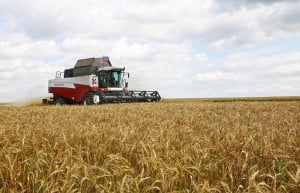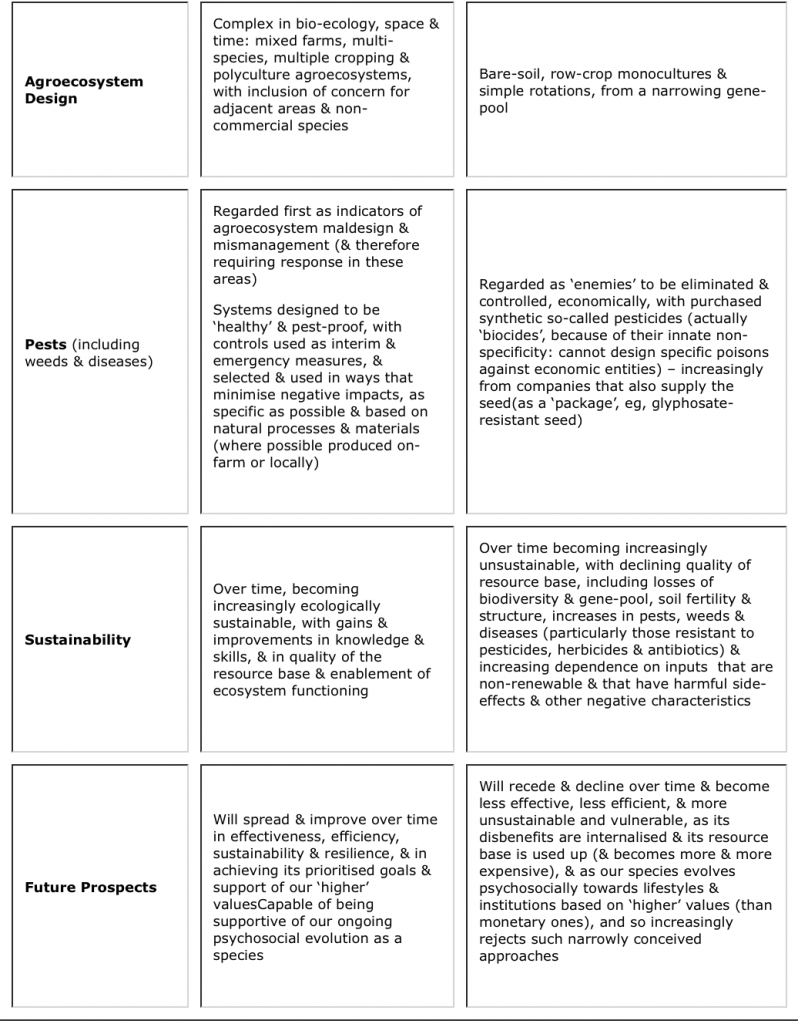Corporate Power Reality Check: Organic Vs Industrial Chemical-Dependent Agriculture

What follows is a summary of this article, ‘A System of Food Production for Human Need, Not Corporate Greed’, and is a preamble to something that was recently forwarded to me by Emeritus Professor Stuart B. Hill, Foundation Chair of Social Ecology, School of Education, Western Sydney University.
In 2007, as part of a requested submission to the International Assessment of Agricultural Knowledge, Science and Technology for Development (IAASTD), Professor Hill submitted a very useful and concise table comparing the philosophies and practices of organic-based agriculture (including agroecology) and chemical-intensive, industrialised agriculture.
I’ve taken the time to present Prof. Hill’s work here because, although it is 10 years old, it is a valuable reminder of the differences between the two models and why the world must step off the chemical treadmill and move towards a more organic-based system of farming.
Introduction
There has been an adverse trend in the food and agriculture sector in recent times with the control of seeds and chemical inputs being consolidated through various proposed mergers. Over the past couple of decades, there has already been a restriction of choice with the squeezing out of competitors, resulting in higher costs for farmers, who are increasingly reliant on corporate seeds (and their chemical inputs).
Big agribusiness players like Monsanto rely on massive taxpayer handouts to keep their business models on track; highly profitable models that have immense social, health and environmental costs to be paid for by the public. Across the globe healthy, sustainable agriculture has been uprooted and transformed to suit the profit margins of transnational agribusiness concerns. The major players in the global agribusiness sector fuel a geo-politicised, globalised system of food production that result in numerous negative outcomes for both farmers and consumers alike (listed here: 4th paragraph from the end).
The extremely wealthy interests behind these corporations do their level best to displace or dismantle alternative models of production – whether agroecology, organic, public sector agriculture systems or anything that exists independently from them – and replace them with ones that serve their needs. Look no further than attempts attempts to undermine indigenous edible oils processing in India, for instance. Look no further than the ‘mustard seed crisis‘ in India in 1998. Or look no further than how transnational biotech helped fuel and then benefit from the destruction of Ethiopia’s traditional agrarian economy.
Whether it’s on the back of US-backed coups (Ukraine), military conflicts (Iraq), ‘structural adjustment’ (Africa) or slanted trade deals (India), transnational agribusiness is driving a global agenda to suit its interests and eradicate impediments to profit.
Increasing profit and shareholder dividends are the bottom line. And it doesn’t matter how much devastation ensues or how unsustainable their business model is, ‘crisis management’ and ‘innovation’ fuel the corporate-controlled treadmill they seek to impose.
Despite the promise of the Green Revolution, hundreds of millions still go to bed hungry, food has become denutrified, functioning rural economies have been destroyed, diseases have spiked in correlation with the increase in use of pesticides and GMOs, soil has been eroded or degraded, diets are less diverse, global food security has been undermined and access to food is determined by manipulated international markets and speculation – not supply and demand.
Food and agriculture have become wedded to power structures that have created food surplus and food deficit areas and have restructured indigenous agriculture across the world and tied it to an international system of trade based on export-oriented mono-cropping, commodity production for a manipulated and volatile international market and indebtedness to international financial institutions.
Ultimately, the problem is centred on a system of international capitalism that is driving a globalised model of bad food and poor health and the destruction of healthy, sustainable agriculture.
Organic & Conventional Agriculture Compared by Prof. Stuart B. Hill



